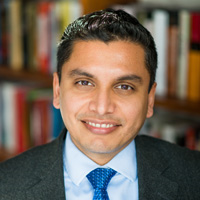BOSTON—Two members of the Harvard Business School (HBS) faculty, along with their research associates, have won awards in the 2017 Case Centre Competition. First presented in 1991, these annual awards, which the Financial Times has described as the “the business school Oscars,” aim to recognize worldwide excellence in case writing and raise the profile of the case method, the centerpiece of participant-centered, discussion-based learning.
Based at Cranfield University in the United Kingdom, the Case Centre is an independent, not-for-profit organization dedicated to promoting the case method in business education and sharing world-leading knowledge and expertise in case teaching, writing, and learning — a pedagogy first applied to management education more than ninety years ago at Harvard Business School.

This year’s HBS winners are Prof. Karthik Ramanna, who after nearly a decade on the faculty is now a Visiting Scholar at the School and professor of business and public policy at Oxford University’s Blavatnik School of Government, where he is also director of its master of public policy program, and HBS research associate Radhika Kak, who were honored for their case “The Maggi Noodle Safety Crisis in India (A), (B), and (C)” in the Outstanding Case Writer competition. In addition, HBS Prof. Robert Simons and senior researcher Natalie Kindred won for “Henkel: Building a Winning Culture” in the Finance, Accounting and Control category.
Karthik Ramanna
Ramanna and Kak look at the actions of the local government in Delhi, which had ordered a ban on Nestlé’s flagship product in India, Maggi Noodles, citing excessive lead content, according to government lab tests. Nestlé disputed these results, noting that internal and third-party tests showed the product to be safe. Nonetheless, Maggi sales began to tumble. To make matters worse, other local governments and India’s food-safety regulators were also considering bans. Putting themselves in the shoes of Nestle executives, students reading the case must decide how to respond, including such options as suing the regulators and withdrawing the product from stores.
“Radhika and I are deeply honored and humbled to win this competition,” said Ramanna, “all the more so given the high quality of the other entries.”
Robert Simons
Simons and Kindred examine a CEO-led organizational transformation driven by stretch goals, performance measurement, and accountability. When Kasper Rorsted became CEO of Henkel, a Germany-based producer of personal care, laundry, and adhesives products, in 2008, he was determined to transform a corporate culture of “good enough” into one focused on winning in a competitive marketplace by introducing ambitious financial targets and a new set of company values and instituting a new, simplified performance management system. The case illustrates the use of control systems as levers of strategic change and the adoption of performance management programs to generate creative tension and performance pressure.
“Natalie and I are very pleased to learn that our case is proving to be popular with educators around the world,” said Simon, who developed the case for his second-year elective MBA course Designing Competitive Organizations. “We are most appreciative.”













